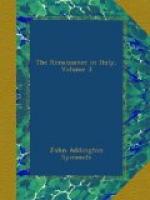As a man, Cellini excites more interest than as an artist; and for this reason I have refrained from entering into minute criticism of his few remaining masterpieces. It has been well said that the two extremes of society, the statesman and the craftsman, find their point of meeting in Machiavelli and Cellini, inasmuch as both recognise no moral authority but the individual will.[388] The virtu, extolled by Machiavelli is exemplified by Cellini. Machiavelli bids his prince ignore the laws; Cellini respects no tribunal and takes justice into his own hands. The word conscience does not occur in Machiavelli’s phraseology of ethics; conscience never makes a coward of Cellini, and in the dungeons of S. Angelo he is visited by no remorse. If we seek a literary parallel for the statesman and the artist in their idealisation of force and personal character, we find it in Pietro Aretino. In him, too, conscience is extinct; for him, also, there is no respect of King or Pope; he has placed himself above law, and substituted his own will for justice. With his pen, as Cellini with his dagger, he assassinates; his cynicism serves him for a coat of armour. And so abject is society, so natural has tyranny become, that he extorts blackmail from monarchs, makes princes tremble, and receives smooth answers to his insults from Buonarroti. These three men, Machiavelli, Cellini, and Aretino, each in his own line, and with the proper differences that pertain to philosophic genius, artistic skill, and ribald ruffianism, sufficiently indicate the dissolution of the social bond in Italy. They mark their age as the age of adventurers, bandits, bullies, Ishmaelites, and tyrants.
FOOTNOTES:
[345] “In lode e onor della vita sua e opere d’esso, e buona disposizione della anima e del corpo.” La Vita di Benvenuto Cellini, Firenze, Le Monnier, 1852; Documenti, p. 578.
[346] I do not by this mean to commit myself to the opinion that Cellini is accurate in details or truthful. On the contrary, it is impossible to read his life without feeling that his vanity and self-esteem led him to exaggeration and mis-statement. The value of the biography consists in its picturesqueness, its brilliant and faithful colouring, and its unconscious self-revelation of an energetic character.
[347] With regard to his pedigree Cellini tells a ridiculous story about a certain Fiorino da Cellino, one of Julius Caesar’s captains, who gave his name to Florence. For the arms of the Cellini family, see lib. i. cap. 50.
[348] To enlarge upon this point is hardly necessary; or it would be easy to prove from documentary evidence that artists so eminent as Simone Martini, Gentile da Fabriano, Perugino, and Ghirlandajo kept open shops, where customers could buy the products of their craft from a highly-finished altar-piece down to a painted buckler or a sign to hang above the street-door. The commercial status of fine art in Italy was highly beneficial to its advancement, inasmuch as it implied a thorough technical apprenticeship for learners. The defective side of the system was apparent in great workshops like that of Raphael, who undertook painting-commissions quite beyond his powers of conscientious execution.




